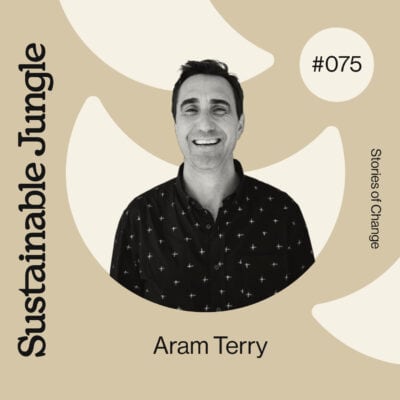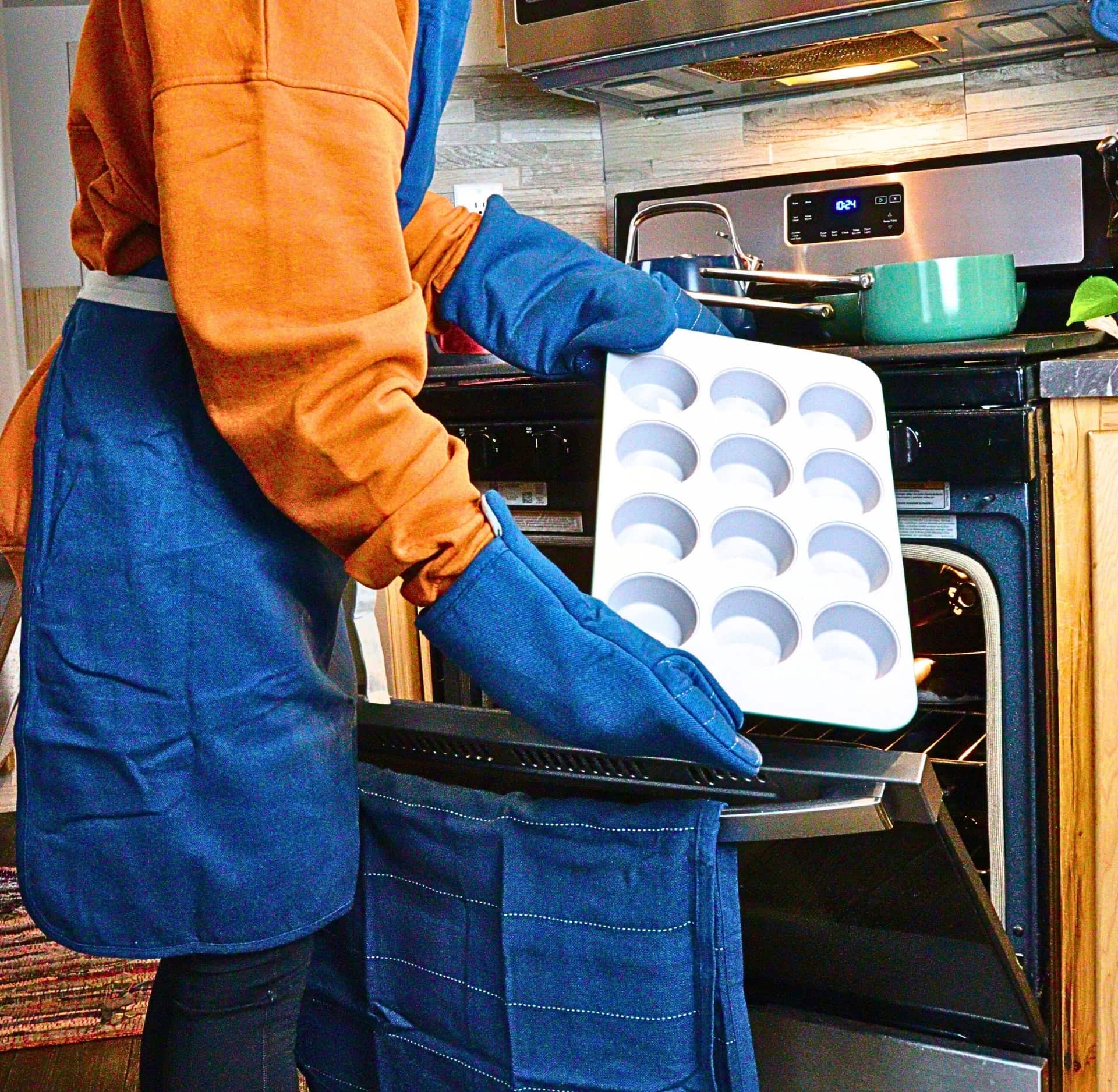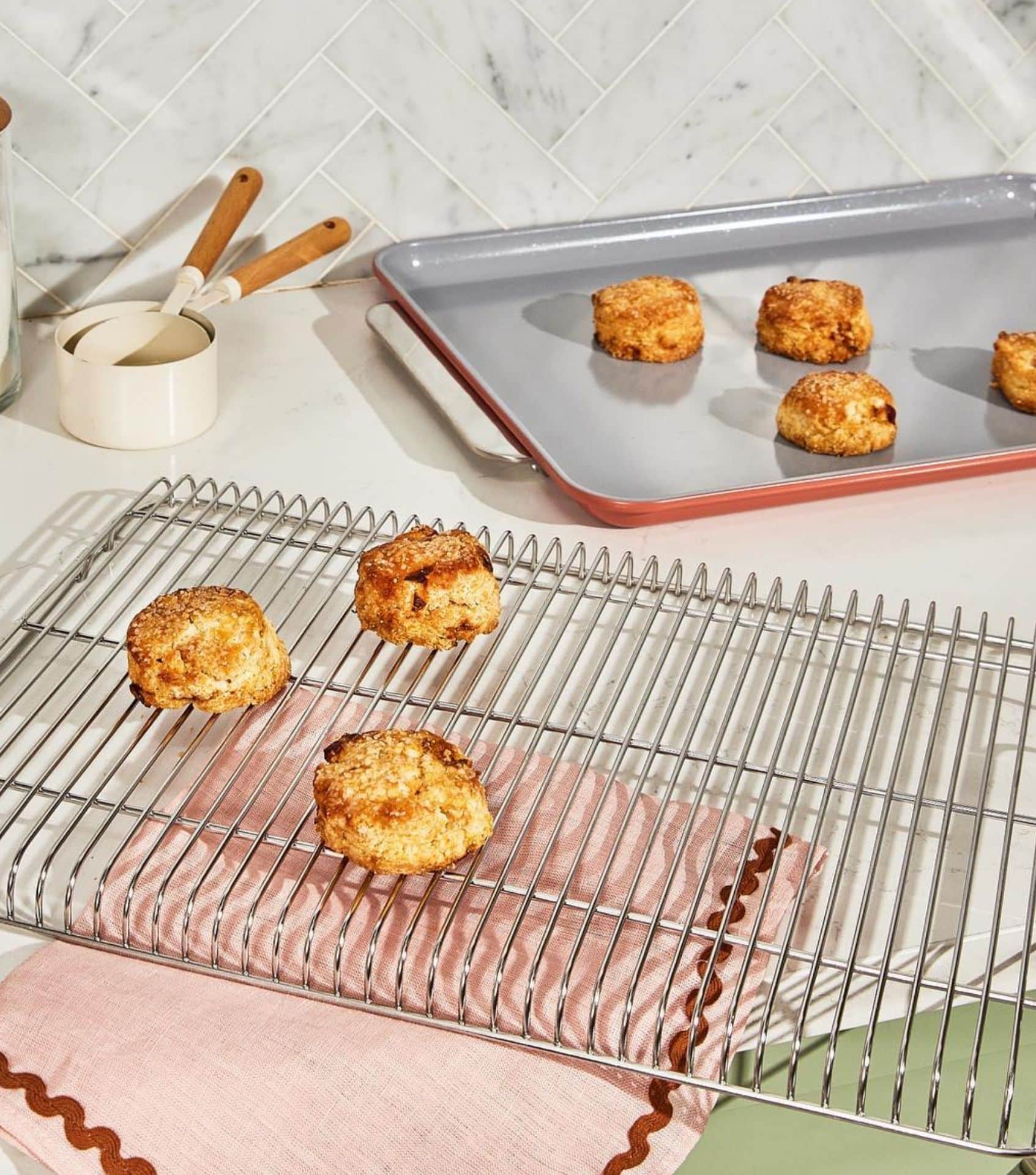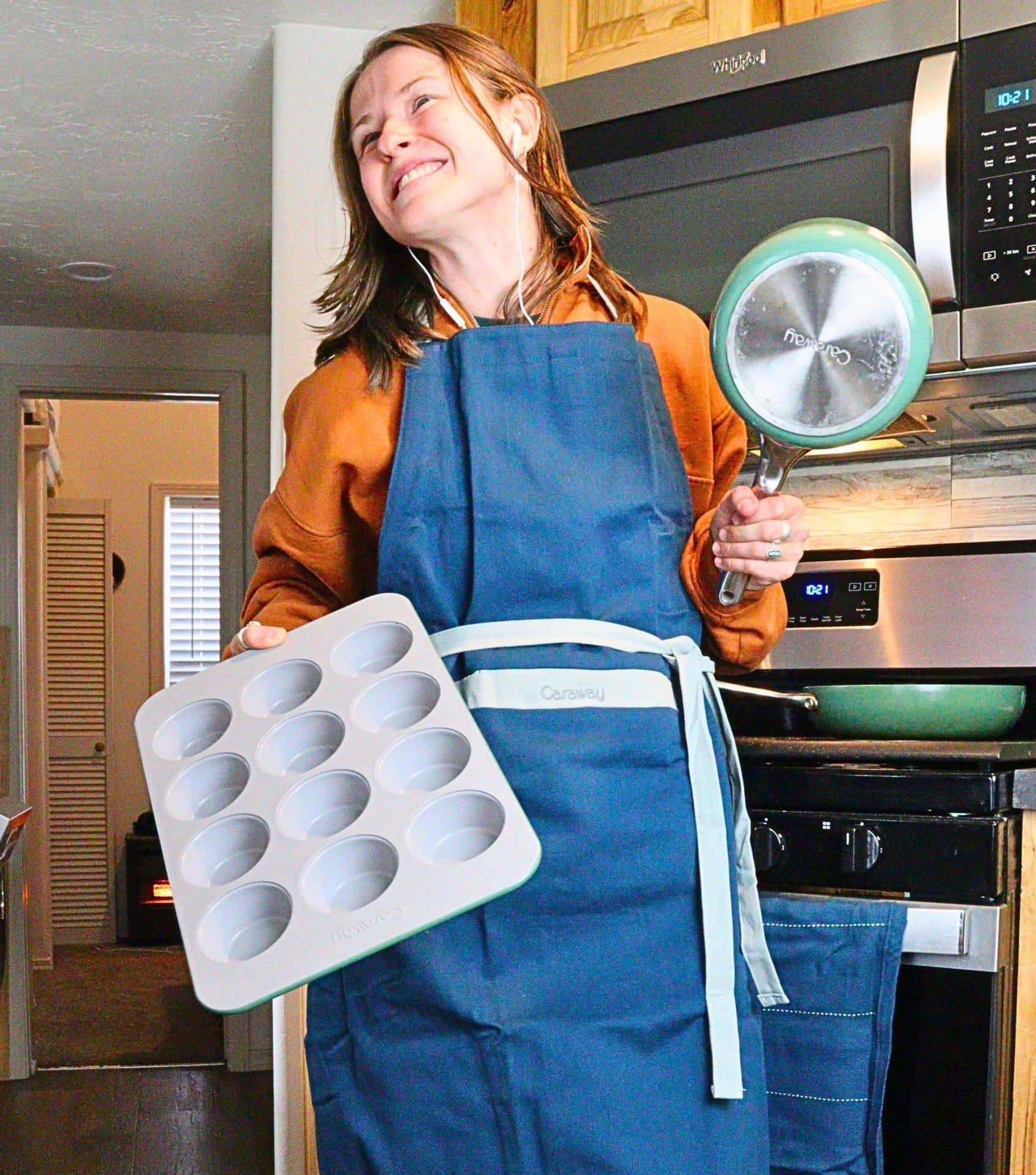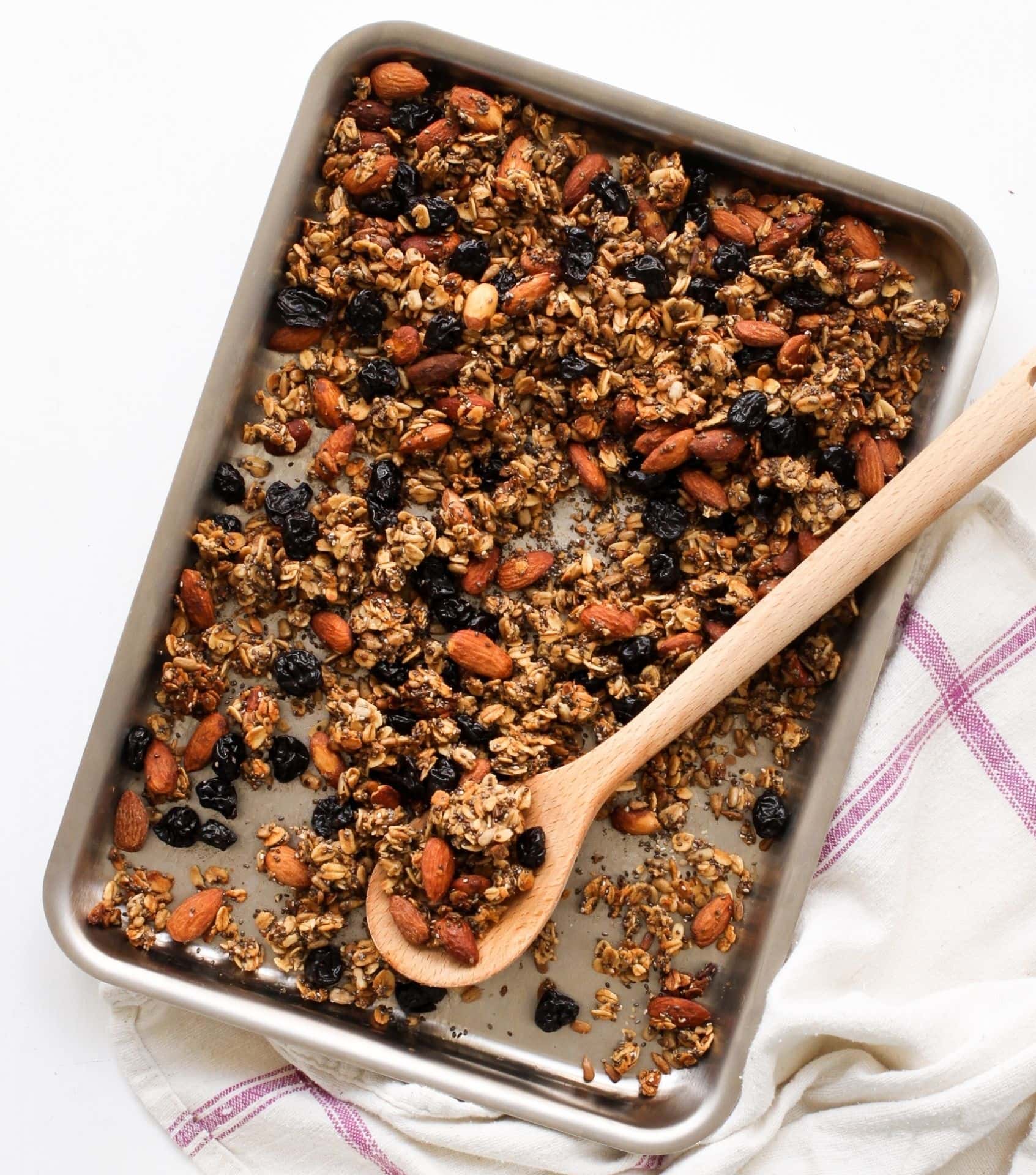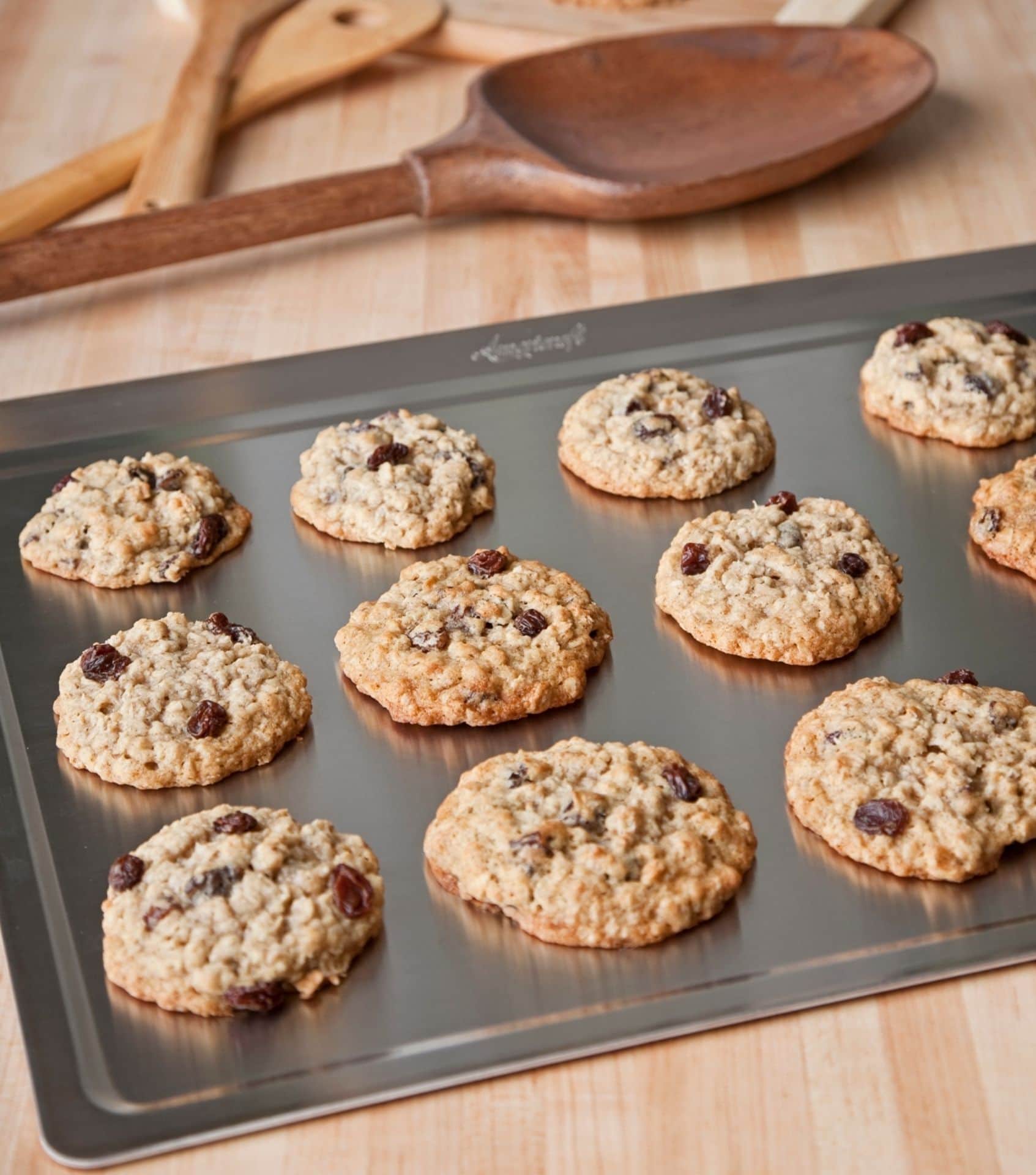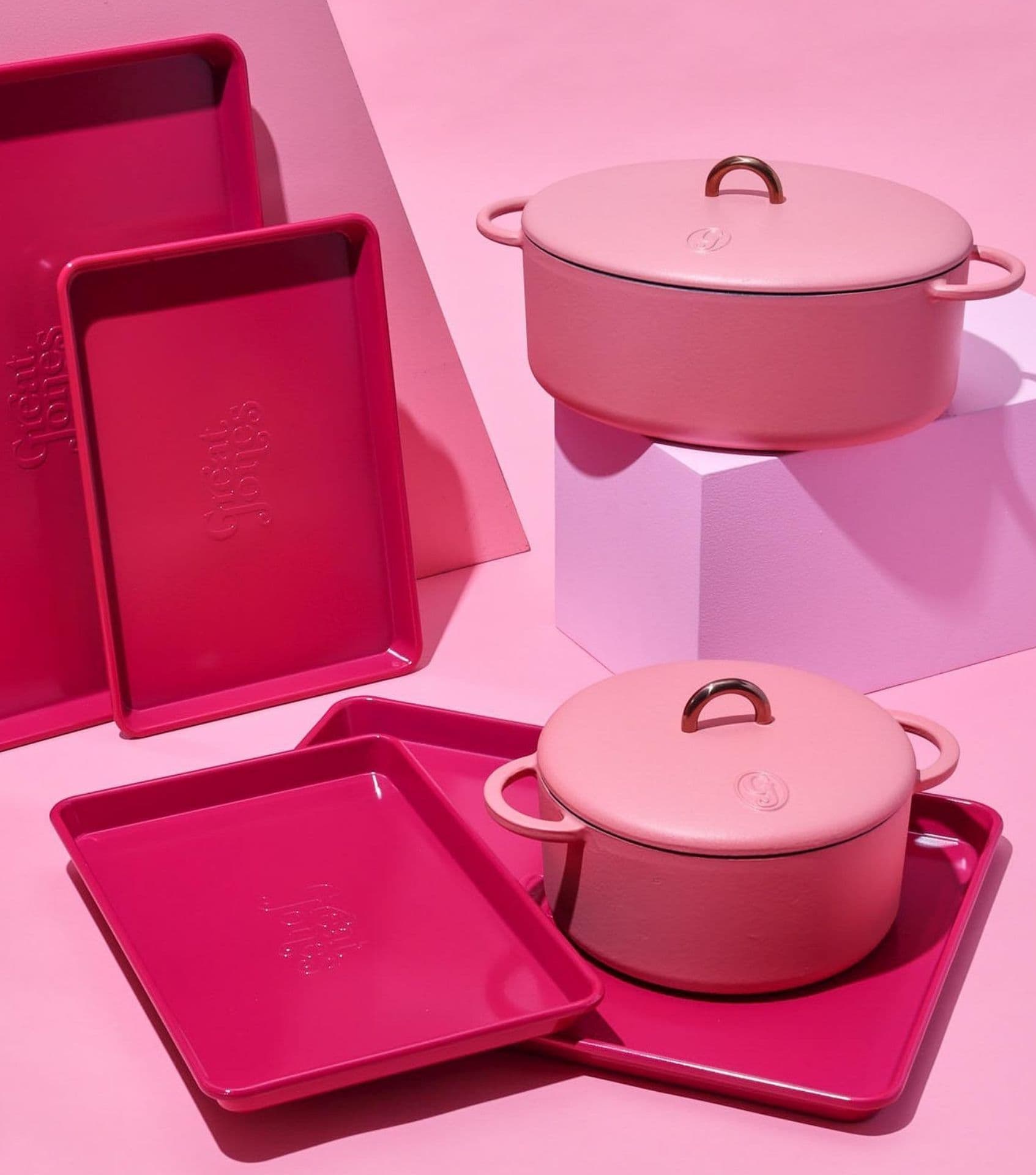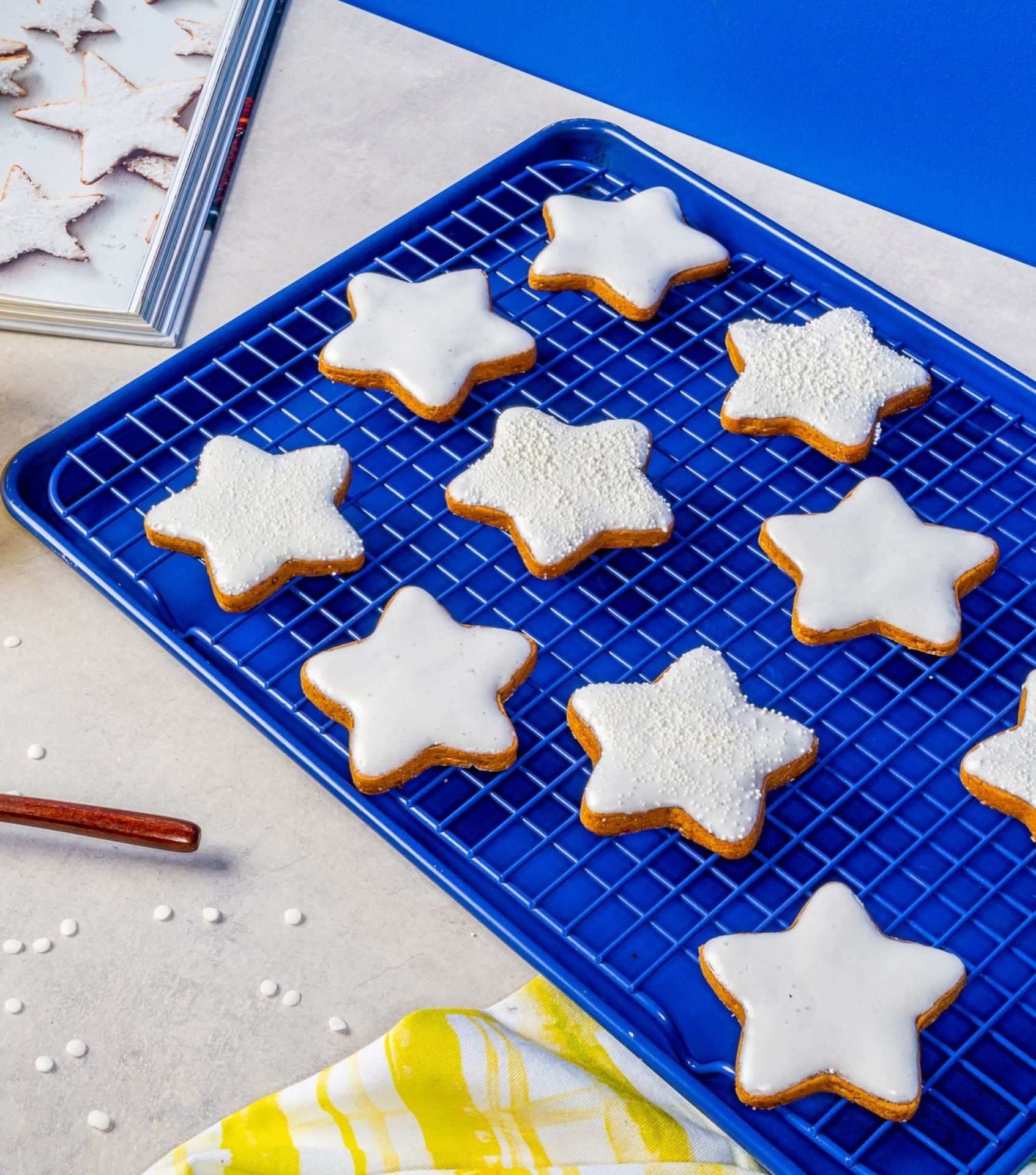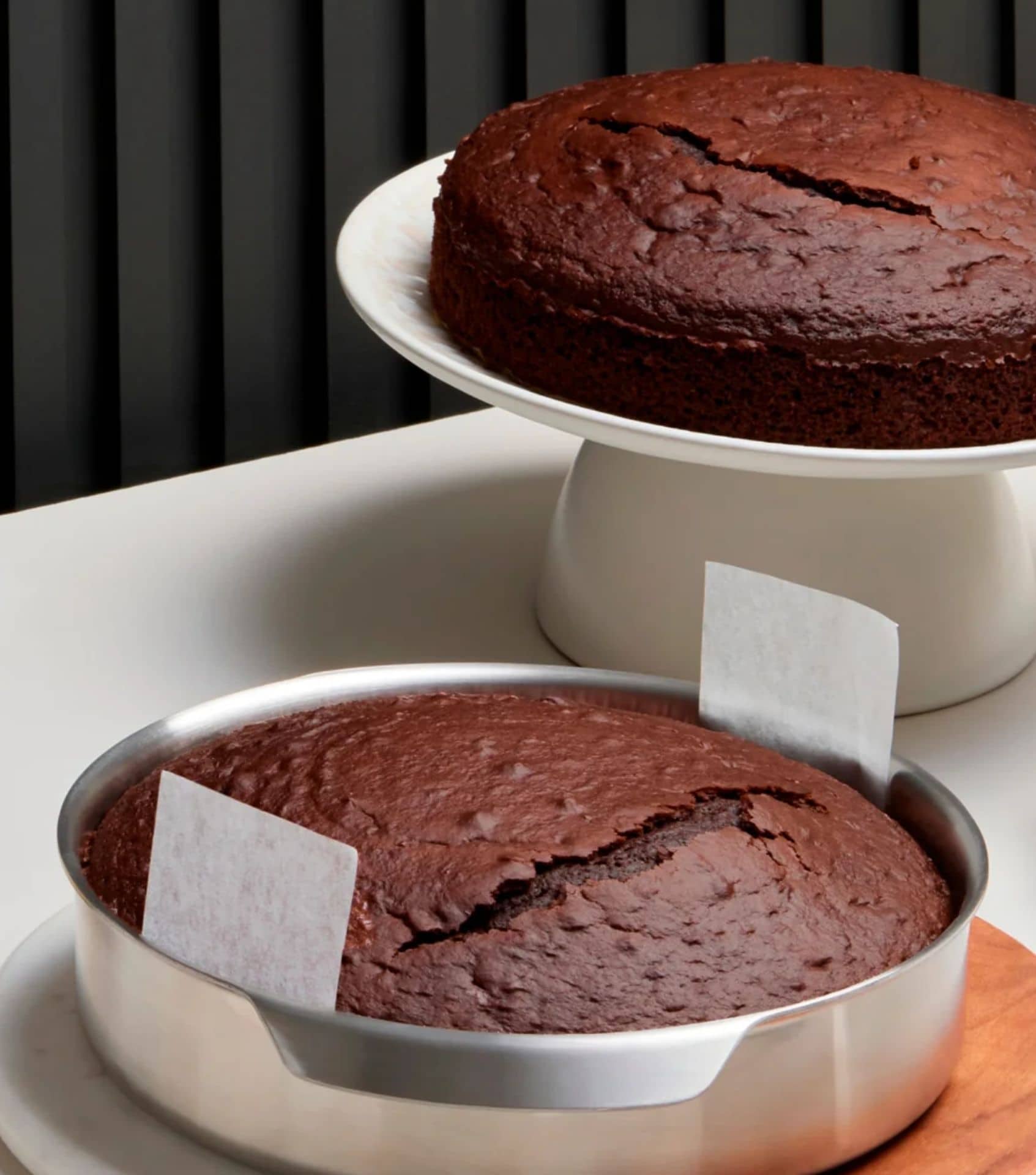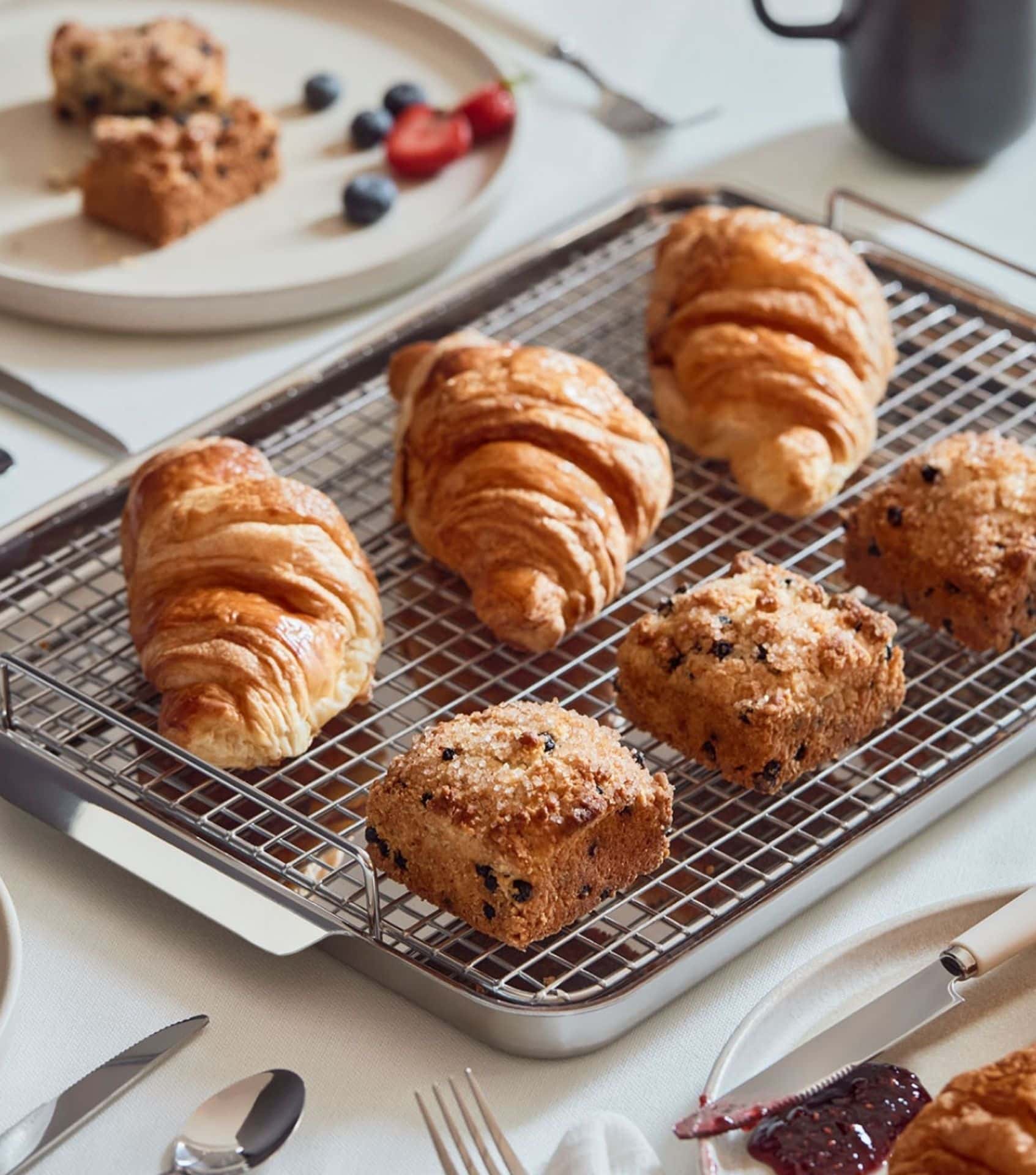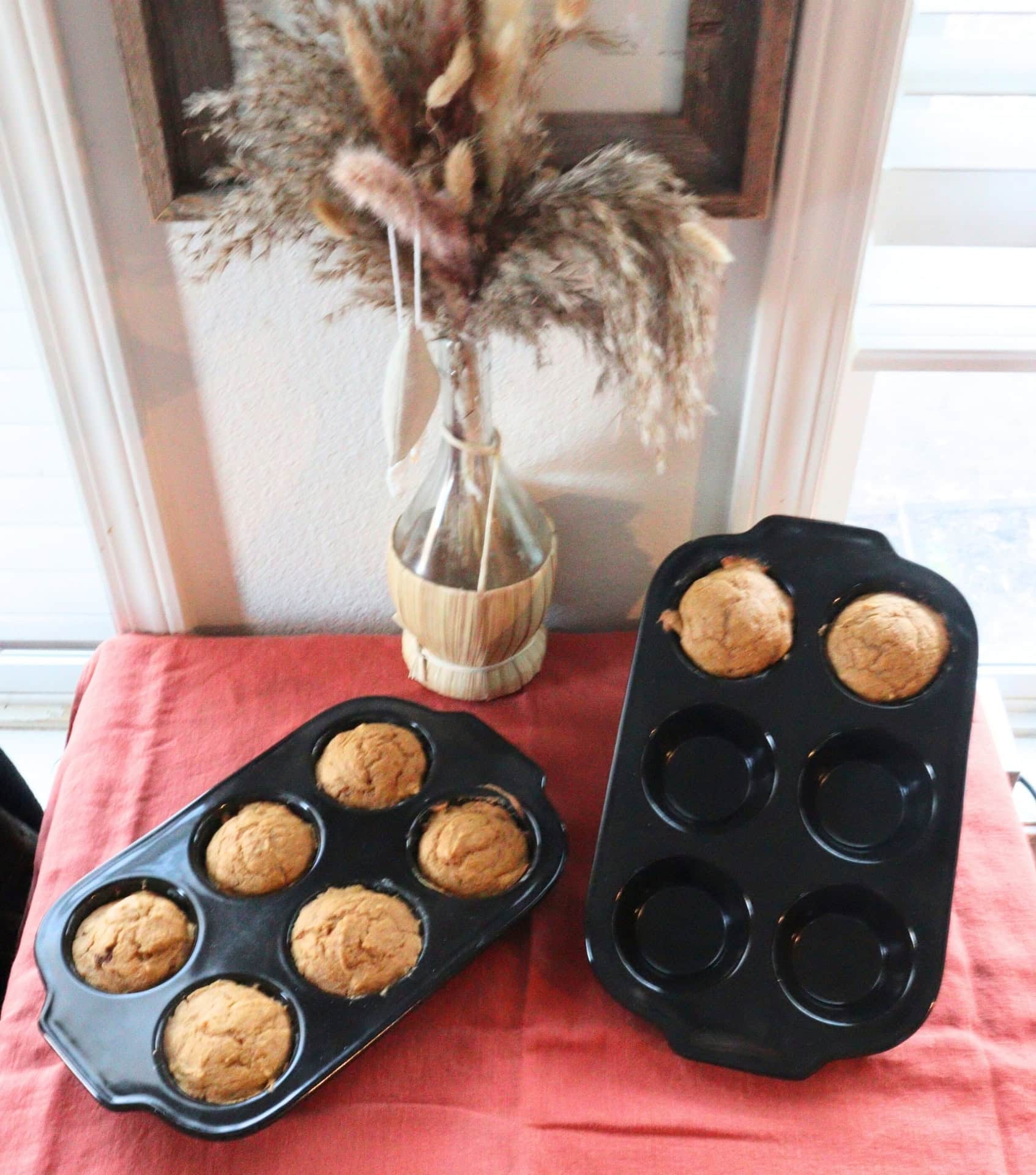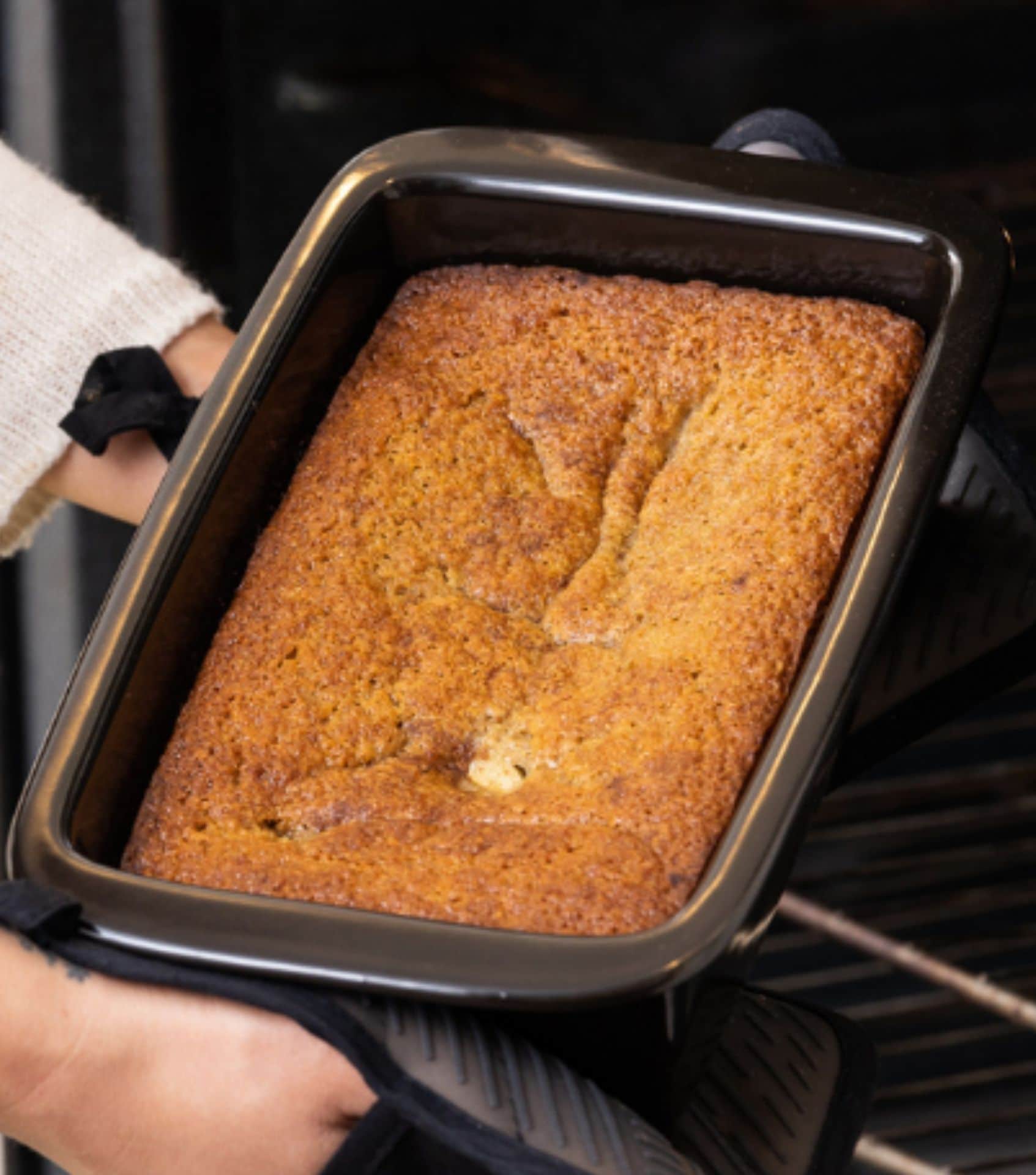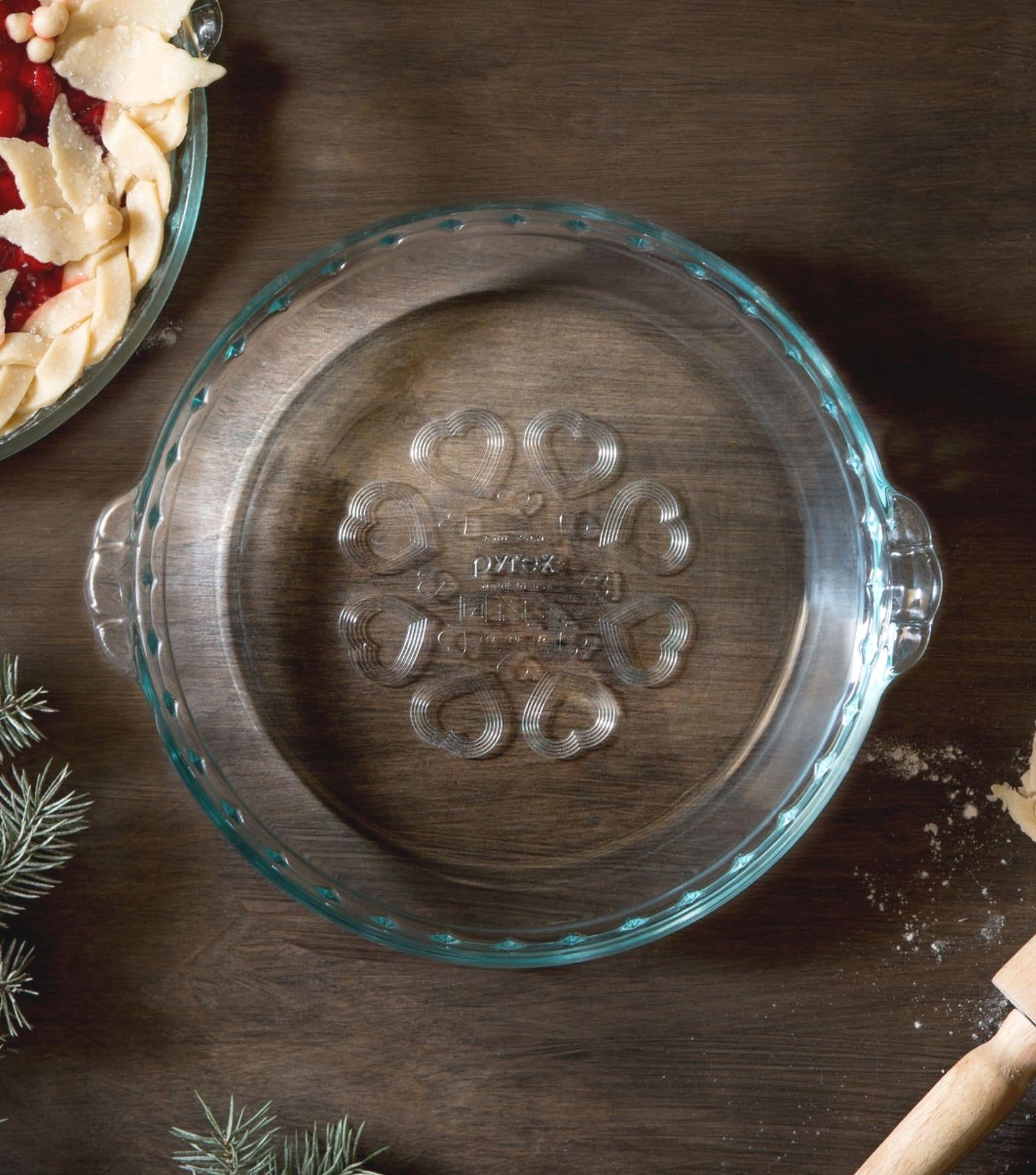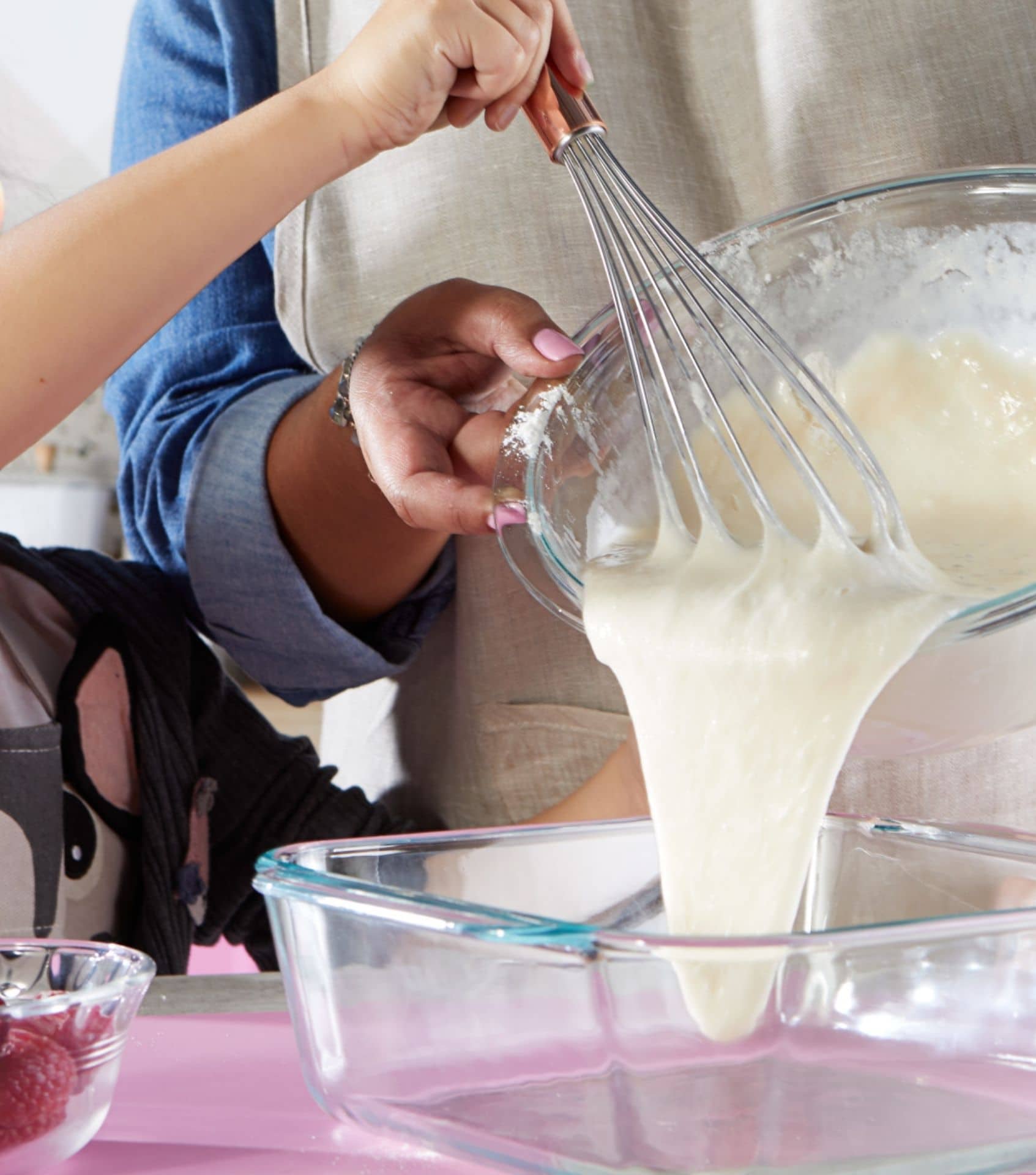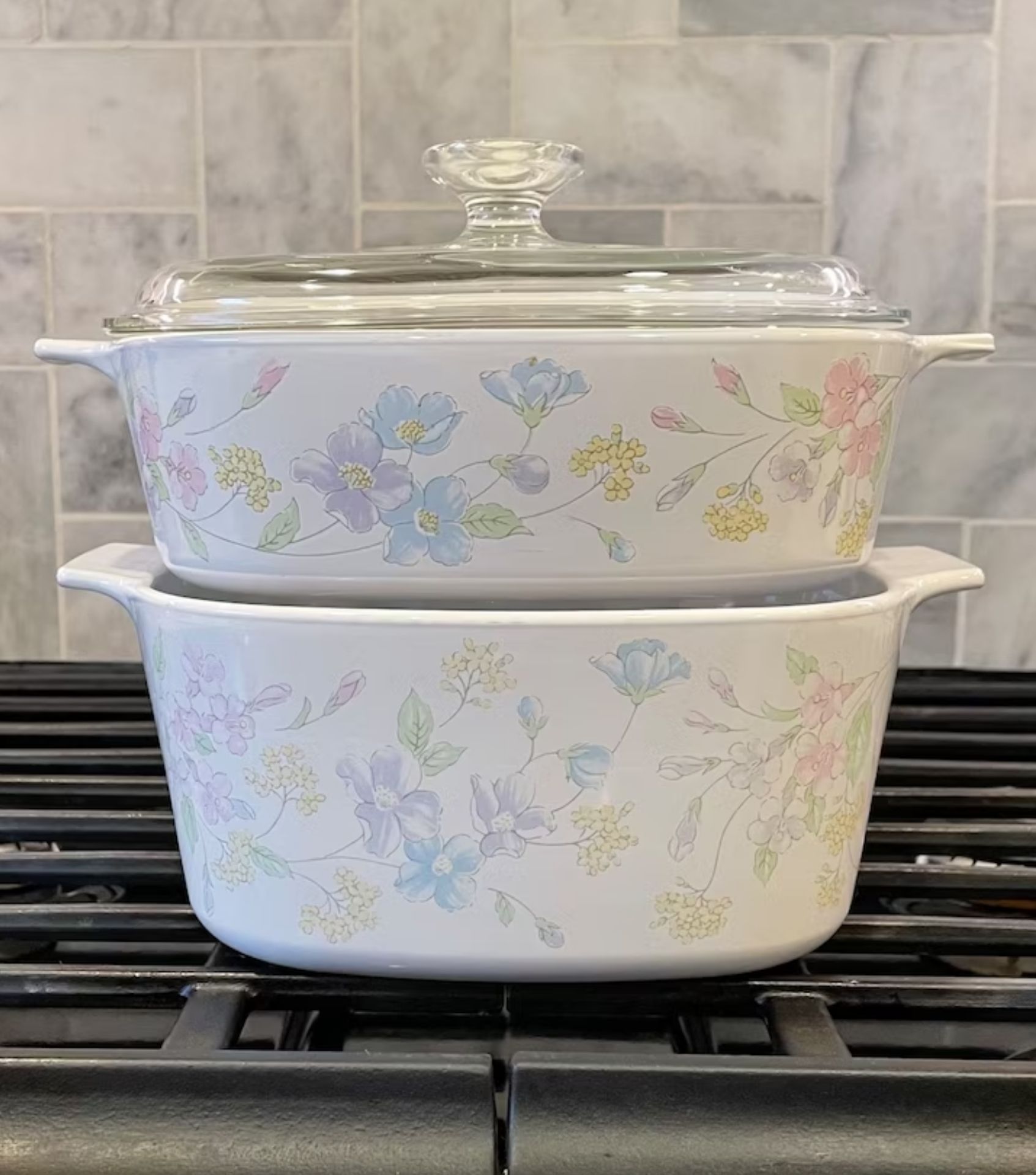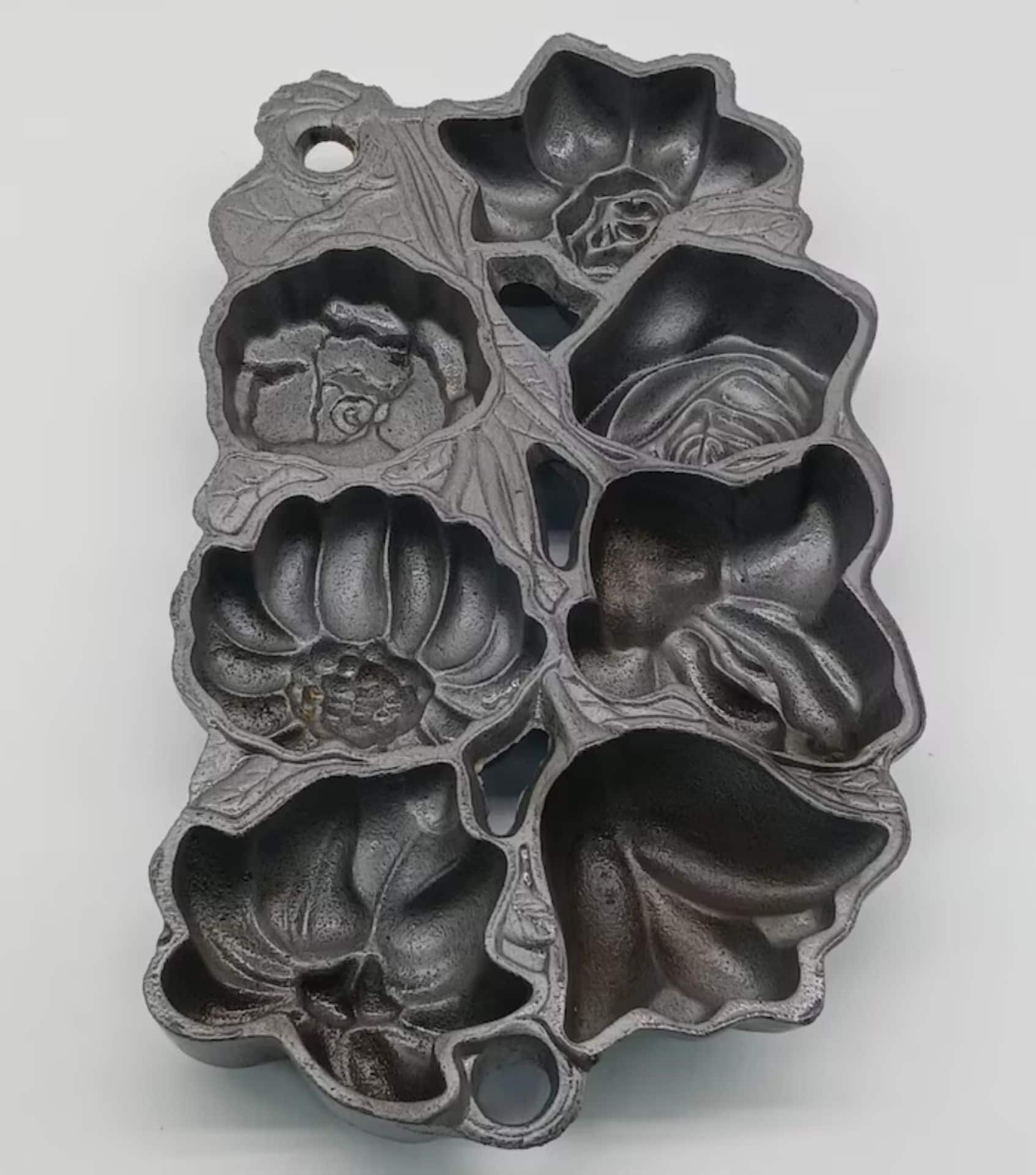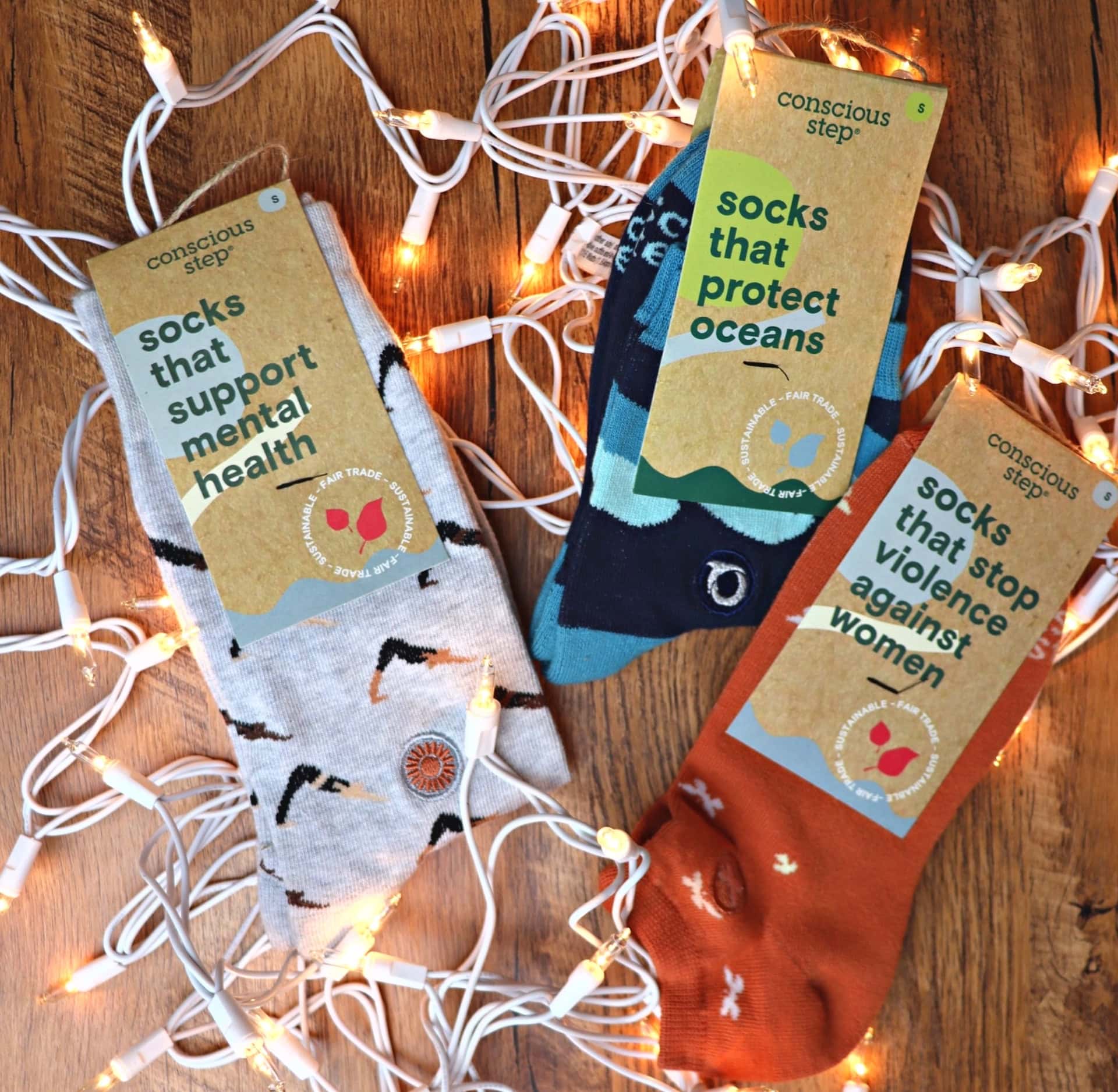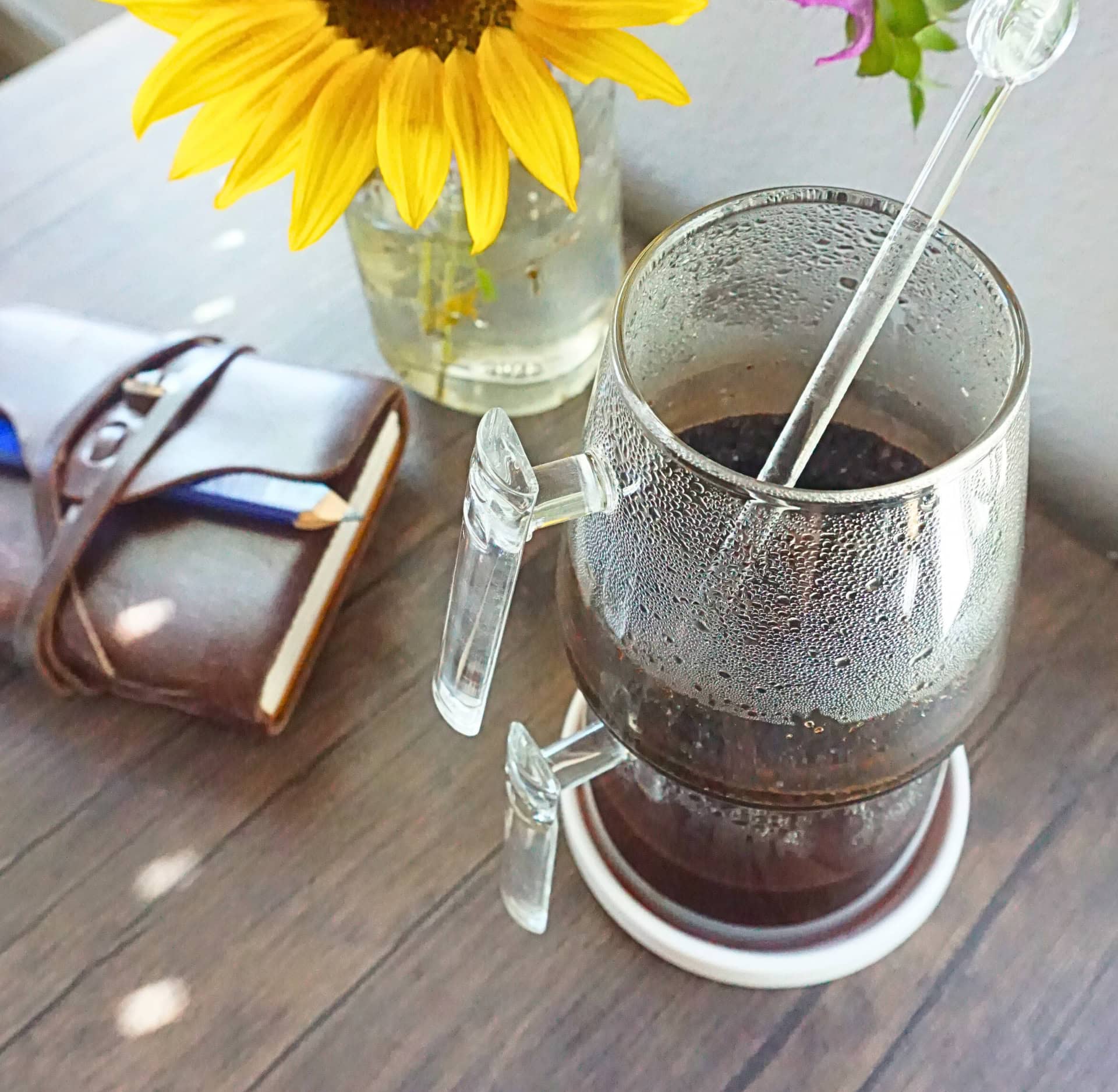Conventional non-stick coatings get a big no-no from us. They can weaken and leach metal and toxic residue into your food at high heat. Not to mention that baking acidic foods—like your favorite fruit pastries—wears down the coating and reduces the life of your bakeware.
If your bakeware is warping, stained, rusting, or scratched it’s probably a good time to consider upgrading to high-quality non-toxic bakeware.
And that’s exactly what we’re serving up here. A selection of our favorite dutch ovens, baking sheets, muffin pans, cake tins and more. They’re all made by brands who not only use safe materials and coatings (backed by relevant certifications) but also prioritize green business practices and ethical labor.
As with all our eco-friendly cookware, our new Brand Rating System helps us find the very best bakeware. When we circle back to this article, this system will assess brands against a broader range of sustainability-related criteria, like climate impact and chemical use. You can learn more about it here.
In the meantime, get a loaf (pan) of these brands that are filling our kitchens with the kind of bakeware you’ll want (and be able to) to use for years to come.
We independently research all featured brands and we ask them to confirm their claims. In many cases we personally review recommended products. This post contains affiliate links which means we may earn a commission if you buy something. Learn more here.
The Safest Bakeware We Love To Use
Caraway isn’t just one of our favorite bakeware brands for its colorful aesthetic (though we have to admit we love the way that it looks in our kitchen). Their ceramic-coated bakeware emits significantly less carbon in production than traditional ones.
You’ll do a little dance in your eco-friendly apron with a full 360 spin once you learn about the extensive range of chemicals not present in 360 Cookware’s equally extensive range for the healthiest bakeware.
Index: Healthiest Bakeware Brands
- Caraway Jump to brand
- 360 Cookware Jump to brand
- Great Jones Jump to brand
- Kana Jump to brand
- Xtrema Jump to brand
- Pyrex Jump to brand
- Vintage Bakeware Jump to brand
Caraway
About Caraway
Price Range: $40–$1,830
If you’re looking for a pop of color with all the benefits of toxin-free cooking, US based Caraway offers à la carte items or sets of five or eleven pieces for ultimate guest entertaining.
You’ll find the full spectrum of ceramic-coated options including muffin bakeware, loaf pans, baking sheets, square and circle pans, as well as cooling racks and a storage container to keep it all neat and tidy.
Caraway’s Ethical & Sustainability Practices
Materials:
Utilizing an aluminized steel body with handles made from stainless steel, Caraway’s bakeware has a non-toxic ceramic coating keeping harmful chemicals (like PFAS, PTFE, and PFOA) from leaching into your delicious dinner.
While ceramic coatings are a sturdy option under proper care, its Achilles heel is metal cooking utensils, so steer clear of scraping these to dish up any baked goods.
Supply chain & labor practices:
Their bakeware is produced in ethical BSCI and SMETA-certified factories in China. Their partners uphold fair working conditions, employee benefits, and living wages because while we may slave away in our zero waste kitchen for a beautiful family meal, workers should not.
Carbon commitments & green practices:
Caraway’s ceramic coating emits 60% less CO2 during production compared to other non-stick options. They also make a point to use low-waste packaging materials, incorporate organic cotton in their kitchen linens, and prioritize low-impact dyes.
My Personal Review of Caraway’s Bakeware Set:
Apart from bread, I’ve never been big on baking, mostly because I can’t stand those toxic non-stick sprays. But Caraway is a total game-changer. Their non-toxic ceramic coating, paired with just a bit of coconut oil, makes it so easy to get muffins and cakes out of the pan without a fight, and cleanup is a total breeze. The way this bakeware nests together means I can stash everything in a small space and save room in my (literal) tiny kitchen.”
Review by Amber McDaniel, SJ’s Head of Content
360 Cookware
About 360 Cookware
Price Range: $128–$1,022
360 Cookware covers all your bases with a huge range of bakeware: sheets, pizza pans, cake pans, pie pans, roast pans, and dozens of cookie cutters for some holiday fun.
360 Cookware’s Ethical & Sustainability Practices
Materials:
Their stainless steel bakeware has a heat-conducting aluminum core which allows for food to heat up more quickly at lower temperatures. Made for oven-safe temperatures up to 500 degrees Fahrenheit, you’ll won’t find any PFAS, PFOS, PFOA, or PTFEs.
Supply chain & labor practices:
Though made in Wisconsin with 20 employees, they do outsource a few items for manufacturing in China and South Korea.
Their US factory provides competitive wages, health care, and IRAs, but there isn’t any information about their Asian partners, so we’ve reached out and will let you know as soon as we do.
Carbon commitments & green practices:
By creating “heirloom quality” products, 360 Cookware encourages consumers to buy, maintain, and pass down these durable items, which keeps them out of landfill. Their manufacturing methods are safe and require no EPA permits.
Great Jones
About Great Jones
Price Range: $28–$275
Great Jones is where retro designs meet modern function, with colorful bakeware to catch attention across the table. An all-female-run small business established in New York City, they’re all about making you feel empowered to make the best meals, no matter the size of your kitchen or family.
The gals at Great Jones take sustainability seriously, but you’ll find lighthearted humor sprinkled throughout their products—like their Little Hottie dish or their bold Holy Sheet pan.
Great Jones’s Ethical & Sustainability Practices
Materials:
Their bakeware consists of three types of materials. The dutch oven pots are enameled cast iron, which makes them dishwasher-safe. All healthy baking sheets, muffin pans, cake pans, and loaf pans are made from aluminized steel, and their selection of pie and casserole baking dishes are in standard ceramic.
All three are lead, cadmium, and PFOA-free, but the nonstick coating on the aluminum bakeware does contain some PTFE or PFOs, so we recommend sticking with the cast iron or ceramic options.
Supply chain & labor practices:
Great Jones’ pieces are manufactured by partners based in Guangdong, and Tianjin, China as well as in the USA, though we don’t have any specifics beyond this.
Carbon commitments & green practices:
Most modern pots and pans cannot be recycled due to the toxic coating, so unless they’re in semi-decent condition to donate, they just end up in a landfill. Great Jones however created a recycling and donation aspect to their business model in partnership with Hot Bread Kitchen in New York.
Alongside this, they offer a lifetime warranty for select items.
Kana
About Kana
Price Range: $105–$375
Kana’s range of Milo bakeware is classically timeless, elegant, and of course, non-toxic. Their design is thoughtfully ergonomic (with handles for grip) and versatile, whether used as grillware, bakeware, or serve ware.
While their collection only consists of cake pans in various sizes and stainless steel baking sheets, the quality is well worth investing in their Bakeware Starter Bundle, created for beginner or advanced bakers alike.
Kana’s Ethical & Sustainability Practices
Materials:
Their TOMATEC™ enameled cast iron dutch oven pots come in 3.3L or 5.5L sizes and are usable on both the stovetop and in the oven up to 500°F. Free from PFOAs and PTFEs, choose from 9 colors to match their cookware.
Milo’s main bakeware is tri-ply clad stainless steel with an aluminum core that tolerates heat up to 1000°F. If you’re after a REACH-certified, durable product that will evenly bake your famous three-tiered cake, Milo will make it happen. All materials are OEKO-TEX certified.
Supply chain & labor practices:
Milo bakeware is manufactured in BSCI and OSI-compliant, family-owned factories. They take workers’ health and safety as well as environmental impact seriously with ISO 9001, 4001, and 45001 certifications, but don’t disclose where the factories are located.
Carbon commitments & green practices:
Kana offsets 100% of its shipping-related carbon emissions.
Xtrema
About Xtrema
Price Range: $40–$210
Xtrema ceramic bakeware is triple-fired and purified at 2,500°F. Nearly 40% lighter than traditional cast iron, this brand knows how to cater to bakers looking for quality dishwasher-safe bakeware without the physically taxing and (environmental) weight.
While donning the standard loaf pan, pie pan, muffin pan, and baking pan, their Grill Pan promises those perfect parallel grill lines.
Xtrema’s Ethical & Sustainability Practices
Materials:
Using 100% all-natural, pure ceramic is one of the safest bakeware materials in the cooking world. With optimal heat retention, you can use it in the microwave, oven, BBQ, or freezer, and you never have to worry about damage in the dishwasher as it is scratch and chip-resistant.
All items are California Prop 65 compliant and certified PFOA and PTFE-free, with no coatings, synthetic glues, polymers, lead, or cadmium that can leach into your meals.
Supply chain & labor practices:
“Creating synergy between mindful cooking, healthy lifestyles, people & the environment” is what Xtrema aims to provide by using skilled artisans from China, where the art of ceramic design is well over 10,000 years old.
Carbon commitments & green practices:
Xtrema claims to minimize waste in its manufacturing processes, but there are no specific details available on its carbon sequestering or reducing initiatives.
My Personal Review of Xtrema’s Muffin Pan:
“Xtrema’s muffin tins feature a non-toxic ceramic surface that ensures even baking and easy release. I still recommend adding a little bit of oil or butter before pouring in the batter, but not much is needed with these. I especially like that their muffin tins come in half a dozen racks rather than a full dozen because full-sized muffin sheets do not fit in my sink, which makes cleanup difficult. These easily fit and scrub clean, so I’ll likely actually make more muffins now.”
Review by Amber McDaniel, SJ’s Head of Content
Pyrex
About Pyrex
Price Range: $9–$50
Pyrex is a well-known household name and has been producingbaking pans and bowls since 1915.
They work with a specialized Borosilicate glass that absorbs heat waves as opposed to reflecting them. This ultimately allows for a faster cook time and thus conserves energy. Fun fact: it was originally designed for railroad lantern glass to be thermal shock resistant.
Made in Pennsylvania, their parent company, Corning, manufactures all Pyrex® Essentials and Easy Grab® glass bakeware—like the Pyrex®Easy Grab 1.9L Covered Casserole.
Pyrex’s Ethical & Sustainability Practices
Materials:
All glass is sand-based, but Borosilicate glass is made by repeatedly heating raw silica sand and boric oxide to extreme temperatures, yielding a product that can withstand high heat and impact.
Pyrex also offers newer cast iron, stainless steel, aluminum, and ceramic bakeware. The most popular is a heavy gauge metal range that has a non-stick coating that is silicone based, but we’re unsure if it may leach harmful chemicals. Your safest bet is to go with the naturally non-stick, oven-safe, and dishwasher-safe glass bakeware.
Supply chain & labor practices:
They run supplier audits independently and through third-party auditors to ensure they follow their Code of Conduct. All suppliers and factories must be RBA-compliant.
Known by Forbes as one of the world’s best employers, they reached 100% gender pay equality across their entire global network. They also scored 90% for the Human Rights Campaign Foundation’s 2021 Corporate Equality Index.
Carbon commitments & green practices:
Corning measures their sustainability goals and achievements in their Sustainability Report. They work with solar energy plants, waste management, and water recycling initiatives to make their factories efficient and environmentally friendly.
Currently, they use power purchase agreements as opposed to carbon offsets. Corning is working towards meeting measures in the Paris Climate Agreement, like 100% renewable energy in the United States, Canada, and Europe.
Because glass and ceramic require extensive amounts of heat and water, they’re actively working with their engineers to discover lower-carbon ways to produce their products to meet their net-zero carbon targets.
Vintage Bakeware
About Etsy Vintage Bakeware
Price Range: Varies
Etsy is a wonderland for used and vintage wares.
We’ll give you a little taste test with Nwfunfinds, a specialty vintage, Oregon-based seller providing mainly Corning ceramic and Pyrex glass bakeware. The amber and blue Pyrex casserole dishes are perfect for keeping a meal hot from the oven to the table. There are also sets of glass cups and other decorative homewares.
Etsy’s Ethical & Sustainability Practices
Materials:
With this seller, you’ll find primarily ceramic bakeware and Pyrex glass bakeware, but there is the odd stainless steel bakeware as well as aluminum baking sheets. Glass and ceramic items are always oven-safe and dishwasher-safe, so there’s no need to stress about their durability or toxicity.
While discovering the unique bakeware of Etsy, you’ll want to be careful and discerning of materials, as legal requirements were once more lax than they are today. Avoid anything made of vintage metal or with enamelled coatings, as there can be toxic chemicals and heavy metals that can leach into your baked goods.
Supply chain & labor practices:
With Etsy, there’s a real person (sometimes just one) behind every shop, and in the case of collectors of vintage bakeware, they simply do it for the love and enjoyment of ensuring these timeless pieces find a second life and home.
Carbon commitments & green practices:
By shopping at nwfunfinds (and a good portion of Etsy as a whole), secondhand items stay out of landfill, thus putting less strain on our natural resources and limiting unnecessary heat and water usage to create more glass and ceramic products.
Etsy offsets 100% of its shipping emissions and operates on renewable energy.
Why Choose Safe Baking Pans?
Eating is a lifelong endeavor (as is figuring out what’s for dinner every night), so if we’re going to be doing it for 100 years, we need to invest in our health, which starts with what we cook food in.
From teflon pie tins to granite stone cookware, it’s a slippery slope (or pan) figuring out whether modern bakeware is toxic. Teflon changed its coating in 2013 to eliminate PFOAs due to serious health implications, but there are other non-stick coatings like those made of a silicone base or containing PTFEs.
This video by the Environmental Working Group (EWG) explains the dangers of PFAS, as well as numerous studies linking them to cancer and other health problems due to the fact that they stay in the environment and human body for a long time after exposure. Now, most modern bakeware and cookware products use a category of “GenX” perfluorochemicals, including PTFE and PFOS. While supposedly “healthy” alternatives, the EPA conducted a study determining its toxicity at near equal measure.
Pair this with the fact that if your aluminum or stainless steel loaf pan has a non-stick coating on it, it can’t be recycled. Buying bakeware that’s pure ceramic or glass avoids excess waste going into landfills.
Because of the toxic nature of non-stick coating leaching into every meal (even if it’s oven-safe), our usual “use what you have until it’s time to replace it” philosophy doesn’t apply here. Bin the toxic bakeware—or better yet, treat it like old Tupperware and come up with a clever (non-food-related) way to upcycled it.
Ensure you’re using non-scratching utensils like silicone and wood so the ceramic coating won’t flake off nanoparticles when it gets scratched—allowing aluminum iron, cadmium, and more heavy metals to find their way into your system. And always ensure you’re following the recommended temperatures that your bakeware can tolerate because regardless of how healthy we want to be, your baking pans can still emit smoke which is equally unsavory.
What Is The Most Non-Toxic Bakeware?
Now you know about chemicals to avoid, what is the best non-toxic bakeware material?
Pure ceramic bakeware is made of renewable and natural resources such as clay and sand, but it does take a lot of heat and water to create. It’s typically free of toxins, but just ensure its non-stick coatings are up to your eco-friendly standards.
One of the best materials for bakeware, cast iron has been used for centuries and for good reason: it is insanely durable. By maintaining it with regular seasoning, it can easily be passed down to other family members and reduce resource usage. Cast iron also has commendable heat retention and even heat distribution, keeping your food warm long after the oven or stove has worked its magic.
Glass bakeware is naturally oven safe, dishwasher-safe, and can be utilized in the microwave or to store food in the fridge or freezer. Just don’t confuse glass bakeware (AKA heat-resistant Borosilicate glass) with regular glass at end-of-life disposal. Borosilicate glass cannot be recycled alongside regular glass and at this time, no specialized services exist to recycle it. So take care of your glass loaf pan and pie dish to ensure they last a lifetime.
Porcelain Enamel is created by mixing ceramic porcelain with a metal like aluminum, steel, or iron. Because of its nonporous nature, it is naturally non-stick, but unfortunately, this doesn’t stop companies from often adding their own toxic coatings. Some downsides are that they don’t do well at high heat for long periods and they are prone to cracks.
Is Aluminum Bakeware Non-Toxic?
Aluminum may fall among oven safe materials, but it’s one to be on the lookout for, since scratches can leak toxic metals into food. Because aluminum itself is toxic, it must be coated in something—and those coatings are usually equally toxic.
While a lightweight material (making it ideal for large servings), it’s not as durable and can give off unwanted flavors.
Is Stainless Steel Bakeware Non-Toxic?
Stainless steel is dent and scratch resistant, as well as anti-corrosive and rust-resistant (but not completely immune to it). Its main downfall is exposure to acidic foods, which can lead to metal leaching. It’s also known for having a decently low thermal heat conductivity.
Carbon steel, on the other hand, is made of carbon and iron, and it does not emit any kind of toxic chemicals at high heat. It is responsive to heat variations so is easy to control, but it is prone to corrosion compared to other metals.
Is Silicone Bakeware Non-Toxic?
Silicone is a synthetic rubber commonly used for muffin pans that is oven safe up to 428F, freezer safe, and said not to leach into food.
But there is debate over its leaching at high heat, and there hasn’t been enough research into silicone bakeware food safety. If blended with anything else, it has poor oven performance (meaning you must look for food-grade pure silicone). It can also develop a sticky texture if not washed and stored properly.
While silicone is not plastic, it’s not widely recyclable, either.

